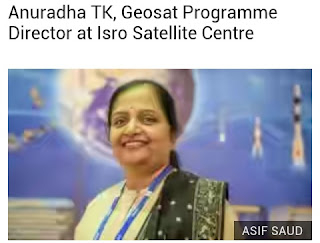The Women Who Took India to Mars
Two years ago, as Indian scientists successfully put a satellite into orbit around Mars, a photograph that went viral showed women dressed in gorgeous saris with flowers in their hair celebrating at the Indian Space Research Organisation (Isro) in the southern city of Bangalore.
It was reported that the ecstatic women were scientists and the photograph challenged the stereotype that rocket science in India was a male preserve.
Isro later clarified that the celebrating women were administrative staff, but it went on to add that there indeed were several women scientists who had worked on the mission and were in the control room at the time of the launch.
The BBC's Geeta Pandey recently travelled to Bangalore to meet some of the women who have taken India into space.
As a little girl growing up in the northern Indian city of Lucknow, Ms Karidhal was an avid sky watcher who "used to wonder about the size of the moon, why it increases and decreases. I wanted to know what lay behind the dark spaces".
A student of science who loved physics and maths, she scoured the daily newspapers for information about Nasa and Isro projects, collected news clippings, and read every little detail about anything related to space science.
After getting her postgraduate degree, "I applied for a job at Isro and that's how I became a space scientist", she says.
It's now been 18 years and Ms Karidhal has worked on several projects at Isro, including the prestigious Mars mission, which has thrust her and her colleagues into the limelight.
The mission began in April 2012 and the scientists only had 18 months to capture Mars.
"It was a very small window, so the big challenge was to realise the project in that time. We had no heritage of interplanetary missions, so we had a lot to do in that short period.
Although women scientists were part of the mission right from the time of conception, Ms Karidhal says its success was due to the team effort.
"We used to sit with the engineers, everyone would brainstorm, irrespective of the time, we often worked the weekends.
A mother of two young children, Ms Karidhal says it was not easy to maintain a work-life balance but "I got the support I needed from my family, my husband and my siblings".
The Mars mission was India's first interplanetary mission
"At the time, my son was 11 and my daughter was five. We had to multi-task, manage time better, but I think that even when I was exhausted at work, I'd go home and see my children and spend time enjoying with them, and I'd feel better and they would also like it."
It's often said that "men are from Mars while women are from Venus" but following the success of the Mars mission, many dubbed India's women scientists the "women from Mars".
"I am a woman from earth, an Indian woman who got an amazing opportunity," Ms Karidhal says.
"Mars mission was an achievement, but we need to do a lot more. The country needs a lot more from us so that the benefit reaches the last man."
Ms Harinath's first exposure to science was Star Trek on television.
"My mother is a maths teacher and my father is an engineer with a great liking for physics and as a family we were all so fond of Star Trek and science fiction and we would sit together and watch it on TV."
Of course, at the time, she never thought of becoming a space scientist and for her, Isro "just happened".
"It was the first job I applied for and I got through. It's been 20 years now and there's been no looking





Comments
Post a Comment